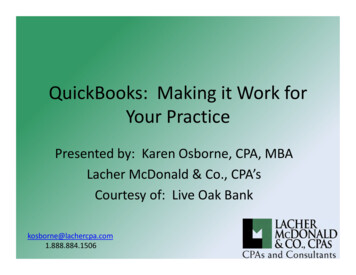
Transcription
TOTALBRAINMAKEOVERTHE HANDBOOK FOR PROCRASTINATION PREVENTIONTAKE THEPROCRASTINATION TEST TOSEE WHAT NEEDS TOCHANGE IN YOUR BRAINLEARN WHY YOURSCHEDULES ARE NOTSERVING YOUSRINI PILLAY, M.D.!WORLD-RENOWNEDHARVARD-TRAINEDPSYCHIATRIST ANDBRAIN-IMAGINGRESEARCHER
2!Copyright: Srinivasan S. Pillay, M.D.First EditionPublished and Distributed by NeuroBusiness Group, LLCwww.neurobusinessgroup.comEdited by Srinivasan S. Pillay, M.D., Judith Cardenas, Ph.D., and MeganBateAll Rights ReservedNo part of this document or the publications therein may be reproducedwithout the explicit written permission of NBG Press. To obtainpermission, please e-mail us at solutions@neurobusinessgroup.comPublished in Newton, MAHealth Information DisclaimerThe information contained in this book is general in nature, and is not meantto substitute for the advice provided by your own physician or other medicalprofessional. None of the statements in this book are a recommendation forhow to treat any particular disease or health-related condition. If you suspectyou have a disease or health-related condition of any kind, you should contactyour health care professional immediately. Recommendations are notintended to diagnose, treat, cure, or prevent disease
3!Have you tried setting deadlines?Making priority lists?Decreasing interruptions?Scheduling?And you still can’t catch up?Then read through this guide on the psychology ofprocrastinators to see why your brain may not befunctioning at its best – and discover how to change it
4!!!!!!!TOTAL BRAIN MAKEOVERPROCRASTINATOR QUIZAnswer True or False to each of the following statements:1. Anxiety drives me to complete things2. It is often difficult for me to decide next steps, causing me to delaytaking action3. Tasks are often so annoying that I simply cannot face doing them4. I’d often rather be doing something else than what I am working on5. I am not driven by a strong sense of purpose in my work6. I love the last minute high just before I get something done7. Things are often equally important, so prioritization is impossible8. I can’t get things done if the deadline is way ahead9. My life and time management pull me in different directions atdifferent timesSCORE GUIDEIF YOU ANSWERED TRUE TO THE PREVIOUS QUESTIONS, THISINDICATES THAT YOU ARE LIKELY THE TYPE OF PROCRASTINATORILLUSTRATED dd up the number of TRUE answers, and compare your total score inthe three categories: AROUSAL, INDECISIVE, and AVOIDANT!
5!!!!!!!!!!!!!!!THE AROUSAL PROCRASTINATORWho are you?You are someone who gets a high from last minute work. You enjoy theadrenaline rush, and/or you rely on it. On your own, it is difficult tomotivate yourself to complete tasks, but if you are given a deadline andare close to it, you are able to muster up the energy you need to finishtasks.Why does this work for you?You find this fun, or at least, you don’t have to rely on having a purposeto complete things. You are someone who could work in an EmergencyDepartment because pressure organizes you. Without this, you wouldsimply be distracted and get nothing done.Why is this a problem for you?You may find this okay now, but the game you are playing is like RussianRoulette.
6!Arousal Procrastinator (Continued)Look at this curve to understand why:Anxiety serves you (and your thinking) well only some of the time. When you reachyour breaking point, you start to burn out. Habitually stressing yourself out mayimpact you more than you think, and can actually make planning more difficult.What is happening in your brain?In your brain, the following things are happening: Brain “freak out”Extreme energy consumptionBrain fatigueBrain/heart stress connectionsMore risk-taking, difficulty deciding, and less creative solutions
7!Diagrammatically, it looks like this:!DECISIONCENTERAROUSALCENTERExcess arousal spreads to your thinking brain and disrupts itWhat can you do about it?There are many things you can do about this, but for one, you need tochange what rewards you. You get off on the excitement of the lastminute, but do not realize that it is like using a drug. It feels good, buttoo much is not good for you.Change what makes you excited. How about super-early finish times onprojects? Changing the focus of reward and becoming excited aboutearly completion will take the “stress” component out of the equation,and also allow you to think more clearly.!STEP #1: Consciously and deliberately train the “reward” button in yourhead to only respond to early completions that do not require a rush tothe finish line.!Activates reward centerEarly FinishTime
8!!!!!!!!!!!!!!THE INDECISIVE PROCRASTINATORWho are you?You are someone who thinks so much that you can’t decide whichdirection to go in. You want to satisfy everyone, and often, you end upsatisfying no one, including yourself. Sometimes you are confusedabout priorities and have a hard time declaring one thing moreimportant than another. You resist multitasking.Why does this work for you?You are a people pleaser and you don’t mind being confused. Youprobably also enjoy thinking deeply and splitting hairs so you makesense at the most subtle level. You may also be a perfectionist and havea high quality of work.Why is this a problem for you?You may find this okay now, but being indecisive does not help you inthe long run. While you are thinking about things, your competition mayget ahead, and even though you are more thorough, you may lose out inthe end. Also, your indecision stems from conflict, and your inability toresolve these conflicts could impact the speed of your success.
9!Indecisive Procrastinator (Continued)Does this look like you?Thinking deeply helps, but not if it delays your action too much. Also, acting soonerrather than later may actually provide data you do not haveWhat is happening in your brain?In your brain, the following things are happening: Your brain is stuck in a perpetual mazeHuge conflicts tire your brain outYour brain is slowed down by the pursuit of perfectionYour brain cannot stay committed to a decisionOld habits trap your brain
10!Diagrammatically, it looks like this:DECISIONCENTERCONFLICTCENTERConflict (deeper in the brain) disrupts decisionsWhat can you do about it?There are many things you can do about this, but for one, you need toresolve any underlying conflicts. Then, make a decision to act by acertain time in a small way. It’s fine if you change your mind about yourpriorities, just complete phases of each task and track them. This is agreat way to jump-start your brain into action.!CUT YOUR THINKINGTIMES DOWN and activate your action center before you are ready.!ACTIONCENTER!Activate the action center sooner than usual. At first this will seem scary, but aftera while, you will realize that action teaches you at least as much as thinking.
11!!!!!!!!!!!!!!THE AVOIDANT PROCRASTINATORWho are you?You are someone who would rather avoid the conflicts and anxiety thanstep into a decision at all. The idea of facing a task and completing it isfar less appealing to you than avoiding it - even though this is a constantcause of anxiety.Why does this work for you?You feel more comfortable, at least for a while. You don’t have to feel thepressure and stress of an Arousal Procrastinator, and you don’t have tofeel the conflict of an Indecisive Procrastinator. Instead, you canfunction without emotional disturbance for long periods of time.Why is this a problem for you?Even if you think you are not disturbed, the sense of incompletenessdoes trouble you and your brain.
12!Avoidant Procrastinator (Continued)You are not invisible to yourself You can put a mask over the problem, but the problem is still there - and in alllikelihood, it will not go away.What is happening in your brain?In your brain, the following things are happening: You feel a constant state of guilt (but try to block it out) Consciously you are fine, but unconsciously your brain is stillin a state of anticipatory anxiety Your brain is paralyzed by threat Your brain is afraid of loss Your brain is constantly exhausted and on the lookout
13!Diagrammatically, it looks like this:Disgust CenterAnxiety CenterFear of loss activates anxiety and disgust, making you decide to do nothingWhat can you do about it?There are many things you can do about this, but for one, you need torecognize that the underlying, subconscious anxiety is eating away atbrain resources. Also, become more aware of, and responsive to, yourguilt about not completing tasks. Segment tasks so they are not sofrightening. !!PROBLEMSEGMENTERBreak tasks down into parts to manage associated fears
14!ConclusionIn some cases, you may engage in more than one type ofprocrastination. In fact, that is quite common. Regardless, start byidentifying the type of procrastination most relevant to you, then workon overcoming your obstacles, moving forward as you develop newhabits.For each type, the principles are:AROUSAL-------- REFRAME (reward for early finishes rather than lastminute)INDECISIVE----- ACT (act before thinking, learn, and act again)AVOIDANT------- SEGMENT (segment tasks to reduce fears)Once you start on this path, you will be much closer to task completionand avoiding delays.NEED MORE? Contact us at solutions@neurobusinessgroup.com!
the handbook for procrastination prevention srini pillay, m.d. ! world-renowned harvard-trained psychiatrist and brain-imaging researcher take the procrastination test to see what needs to change in










